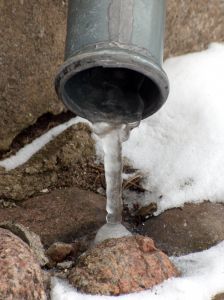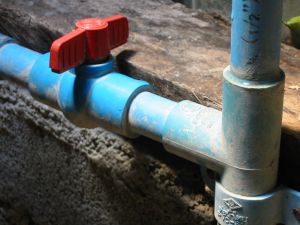 |
Most homeowners don’t consider the damage from frozen and broken water pipes as catastrophic as a natural disaster, but the damages caused from water pipe failures are one of the most common and least recognized catastrophe losses homeowners suffer every year. Second only to hurricanes, frozen and broken water pipes cause more losses in terms of the number of homes damaged and the total amount of claims paid by insurance companies in the U.S.
Repair costs of $50,000 are very common for homes that suffer damage from frozen and broken water pipes. These damages can be a homeowners worst nightmare. When a pipe bursts the water flows, gushes from the pipe, and can turn a basement into a river within minutes. Water damage from frozen and broken pipes causes the most extreme damage when homeowners are away from their house, at work or on vacation because the plumbing can rupture and water can run unnoticed for hours and often several days.
![]() Damages caused by frozen, ruptured water pipes include:
Damages caused by frozen, ruptured water pipes include:
- Soaked and ruined drywall.
- Wallpaper, and paint peal away and can turn moldy.
- Kitchen cabinets warp and may even pull away from a wet wall.
- Carpets and draperies ruined and may need complete replacement depending on how long they remain saturated.
- Lost family pictures and photo albums in most cases they can not be saved if wet.
- Important records and paperwork that in many cases cannot be replaced.
- Damage to antiques, furniture and clothing.
It isn’t uncommon for a home to need a complete reconstruction due to development of mold and mildew. Spores of mold, including the deadly Stachybotrys Mold can start reproducing within hours of a home becoming saturated by the water. Every year families return from vacations to find their homes not only water damaged but mold covering every inch of their home from floor to ceiling.
We can’t prevent the leading cause of water damage loss–hurricanes–but homeowners can take measures to prevent frozen and broken water pipes. Every homeowner with an insurance policy agrees as part of the terms of the policy to take steps to avoid the nightmares of water damage and help reduce the insurance claims and total losses that result. Insurance policyholders share the financial burden of frozen and broken water pipes with increased insurance rates. Prevention is the first line of action for risk management of broken water pipes.
![]() Homeowners can take a few precautions before the next freeze that may save your home from the devastating effects of frozen and broken water pipes. Before it gets too cold be sure to:
Homeowners can take a few precautions before the next freeze that may save your home from the devastating effects of frozen and broken water pipes. Before it gets too cold be sure to:
 Disconnect all garden hoses and other outside water connections. Whenever possible, use an indoor valve to shut off and drain water from pipes leading to outside faucets. This reduces the chance of freezing in the short span of pipe just inside the house. Homeowners might also consider using the Foam insulation covers for outdoor faucets.
Disconnect all garden hoses and other outside water connections. Whenever possible, use an indoor valve to shut off and drain water from pipes leading to outside faucets. This reduces the chance of freezing in the short span of pipe just inside the house. Homeowners might also consider using the Foam insulation covers for outdoor faucets. Insulate any exposed pipes, check for water lines located in the basement, under the house, near or on exterior walls and water lines in attics. Be sure to protect pipes with northern exposures, and wrap UL-approved heat tape. The improper usage of heat tape or pipe insulation can cause a fire so be sure to follow the manufacturer’s instructions.
Insulate any exposed pipes, check for water lines located in the basement, under the house, near or on exterior walls and water lines in attics. Be sure to protect pipes with northern exposures, and wrap UL-approved heat tape. The improper usage of heat tape or pipe insulation can cause a fire so be sure to follow the manufacturer’s instructions. Seal any leaks in your home that might allow cold air inside where pipes are located, especially in the kitchen, and bathrooms.
Seal any leaks in your home that might allow cold air inside where pipes are located, especially in the kitchen, and bathrooms. Keep thermostats set to at least 55 degrees when the house is vacant or while you are on vacation during the winter. It might be a good idea to have someone check on the home while you are away and make sure it’s staying warm enough to prevent pipe freezing.
Keep thermostats set to at least 55 degrees when the house is vacant or while you are on vacation during the winter. It might be a good idea to have someone check on the home while you are away and make sure it’s staying warm enough to prevent pipe freezing.  If you plan to be away for a long period of time drain and shut off the water system completely, except indoor fire sprinkler systems there may be.
If you plan to be away for a long period of time drain and shut off the water system completely, except indoor fire sprinkler systems there may be.
 |
The most important thing to know is how to shut off the water supply if a pipe bursts. And be sure everyone in the family knows how to turn off the water in the event of a burst pipe because quick action will minimize damage. Know What to Do When Your Pipes Freeze–Mitigate Your Losses!
![]() Related Blogs:
Related Blogs:
- What to Do When Your Pipes Freeze–Mitigate Your Losses!
- How To Have a Claim Free Holiday Season
- Do You Need Extra Insurance For Your Personal Property?
Photo credits for this blog entry:  (no use restrictions for these photos)
(no use restrictions for these photos)
Glossary of Insurance Terms:
A | B | C | D | E | F | G | H | I | J-K | L | M | N | O | P | Q-R | S | T | U-V | W-Z
Families.com Blogs are for informational purposes only. Families.com assumes no responsibility for consumer choices. Consumers are reminded that it is their responsibility to research their choices properly and speak to a certified insurance professional prior to making any decision as important as an insurance purchase.

